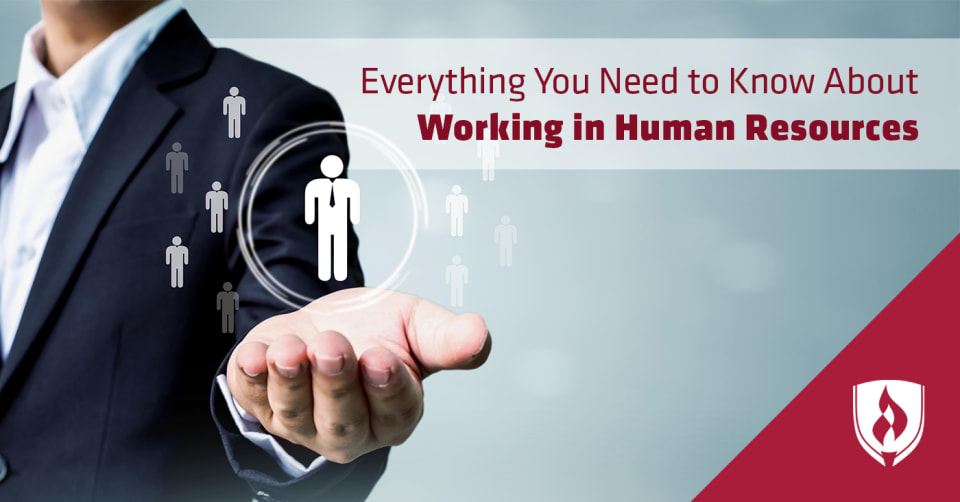
As you’re considering potential career paths, it’s easy to wonder about a career in human resources (HR). For one thing, these professionals are seemingly everywhere, working as important members of nearly every company and organization. Given how common HR professionals are in organizations, it stands to reason that they are a vital component of the business world. But knowing that they must be important is just a start—you want to know more about what these business professionals do and how to get started in the field.
“The human resources department is the backbone of a strong company,” says Smita Dass, human resources manager at Reliance Foundry. “We’re the hidden structure that keeps everything moving forward.”
Of course, the behind-the-scenes nature of HR can also make it tricky to get a grasp on what working in human resources is like for those observing from a distance. “I think employees assume the only time they will see HR is when they are hired, when they’re fired or included in a workplace investigation,” says Eric Mochnacz, consultant at Red Clover HR.
But Mochnacz emphasizes that an effective HR professional is so much more than that. “I enjoy putting the human into human resources. We are the support system for every individual in the organization.”
If that piques your interest, read on! We asked HR pros for details on what human resources does as an industry—and what your job could look like if you’re interested in working in human resources yourself. Or read more about employee tenure trends.
What does human resources do?
As a field—human resources handles the complicated and vast realm of employer and employee relations. “We’re the people who manage the people,” Mochnacz says. “We are responsible for the life cycle of the employee, from hiring to their eventual departure from the company and everything in between.”
“The overarching goal is to make an employee’s work as comfortable and efficient as possible,” says Darya Zhih, a senior HR manager at Belitsoft. “But the exact activities might differ from company to company.”
The Bureau of Labor Statistics (BLS) reports that HR specialists handle employee relations, payroll, benefits and training. They also recruit, screen, interview and place workers.1 But Mochnacz says the role goes far beyond the “steps” of employment. “If an employee has an issue with their manager, we’re here to help. If someone needs to better understand their health coverage, that’s where we come in.”
On the whole, human resources is exactly what it sounds like, says Jennifer Muszczynski, a talent management specialist at Combined Insurance. “A resource for employees at all levels in a variety of areas. Think of HR as the heart of the organization; without us, there is no pulse.”
What is working in human resources like?
Think of a hiring scenario. If you break down the necessary steps it takes for a company to hire a new employee, you’ll have a good idea of the tasks an HR specialist handles.
That means identifying employment needs, conducting interviews, educating employees about compensation, benefits, workplace practices and more, according to the BLS.1 “At my current workplace, I mostly handle recruitment, adaptation and exit interviews,” Zhih says. “But my previous job included creating education plans and managing self-improvement activities for our employees.”
“We must understand people and the vision of the company, while working as organizers, mediators, and planners,” Dass says. “It’s a fascinating, tricky, and very rewarding field.” Dass emphasizes that human resources is a field of continuous learning and of watching people develop each year. “It’s incredibly fulfilling, like planting seeds and watching a garden grow. As our employees flourish, so does our company.”
Another one of the most enjoyable parts of working in HR is the variety of tasks you handle, according to Zhih. “With HR it is easy to weave your hobby into a job—if you like writing, you can create original descriptions for open positions. If you like parties, you can handle organizing team building events and so on.” You can gravitate toward what you like—or even specialize as your career develops.
What skills and qualifications do you need to work in HR?
We used real-time job analysis software from Burning-Glass.com to examine over 200,000 HR job postings over the past 12 months.2 The data helped us identify the top 10 HR skills in highest demand:
- Employee relations
- Onboarding
- HRIS (human resource information systems)
- Customer service
- Scheduling
- Performance management
- Administrative support
- New-hire orientation
- Data entry
- Project management
These skills represent a baseline of soft skills many employers are looking for in HR positions—but a Human Resources and Organizational Leadership degree program will teach you a much deeper skill set to prepare you for the career. And the odds are strong you’ll need it—according to our job posting analysis, 60% of employers prefer HR candidates to have a bachelor’s degree or higher.2
Is HR a good field to go into?
When you are choosing a career direction, you have so many choices on the table. How do you know whether the industry you are choosing is a good pick?
Okay, “knowing” is a strong word for this, but you can definitely make an educated guess based on the career outlook and hiring opportunity.
So how does the HR field stack up? The BLS reports that employment of HR specialists is projected to increase by 7% through 2026.1 The career outlook is brightest for those working in the employment services industry, placement agencies, temporary help services and professional employer organizations. This opportunity exists because companies are increasingly outsourcing their HR functions.
“The beauty of HR is that it is a lucrative field that will give you an opportunity to go down endless career paths,” Muszczynski says. “Additionally, the HR community is quite large and there is an enormous level of support that they can provide, especially if you’re in the early stages of your career.”
Is working in human resources a good fit for you?
Have you ever thought, “Why don’t companies change their rules about XYZ policy?” Or, “why is it so hard to find employers who offer this benefit?” People who thrive in human resources don’t only see what is—but what could be. They look at how the workforce is changing and think about how their companies can adapt, embrace and capitalize on those changes. Check out our article, "7 Signs an Organization Has Strong HR Leadership".
“Workers are looking for flexible work hours, casual dress codes, and non-traditional work environments these days,” Mochnacz says. “An effective HR professional is ahead of the trends in the industry and is already planning to meet these changes.”
If working in human resources sounds interesting to you after gathering this information, it’s time to evaluate your aptitude for the work HR professionals do. Check out our article “9 Top Human Resources Job Skills Employers Are Seeking“ to dig further into what HR pros need to succeed and decide whether you are suited for this career.
Related Articles:
- 5 Things You Won't Find in the Human Resources Job Description
- Human Resources Job Titles for Every Stage of Your Career
- Everything You Need to Know About Becoming a Human Resources Specialist
- MBA vs. MHRM: Which Master's Degree Is Right for You?
- What Is Talent Management and Why Is It So Important?
1Bureau of Labor Statistics, U.S. Department of Labor, Occupational Outlook Handbook, [information accessed April, 2019) www.bls.gov/ooh Employment conditions in your area may vary.
2Burning-Glass.com (analysis of 213,399 human resources job postings, Mar. 01, 2018 and Feb. 28, 2019).
EDITOR’S NOTE: This article was originally published in 2015. It has since been updated to include information relevant to 2019.




